Alexander Pope (1688 -1744) Short biography


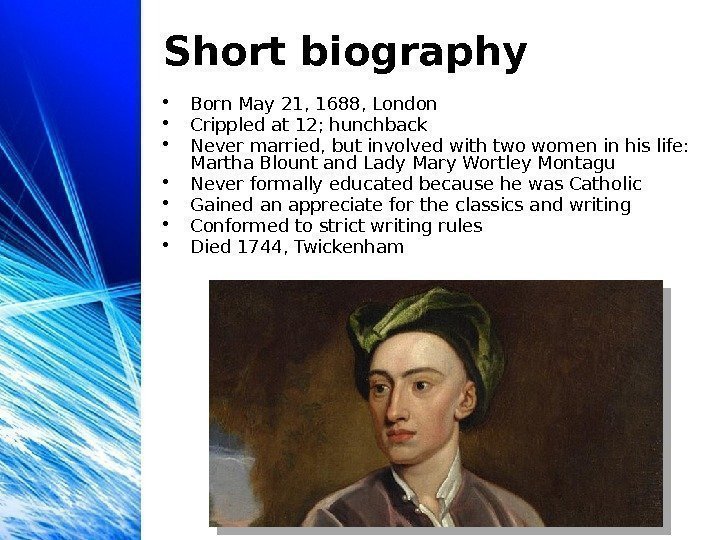
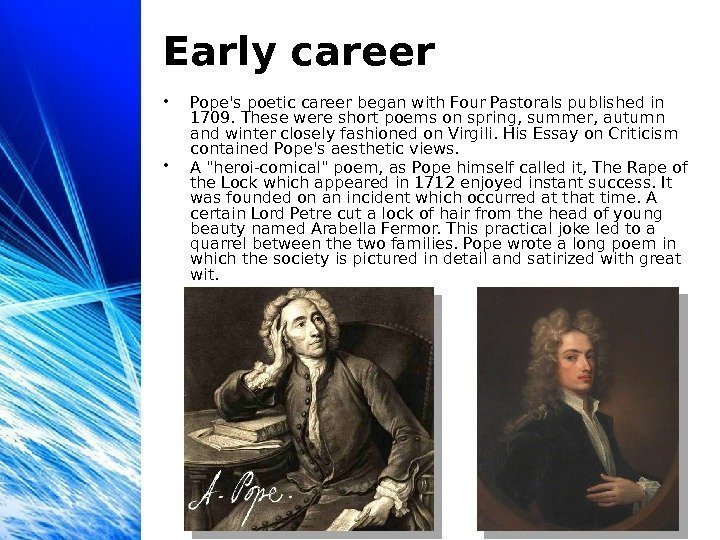
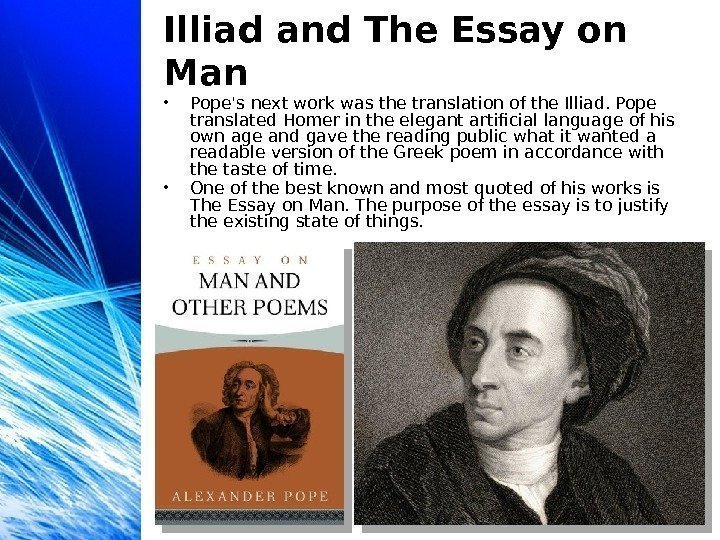
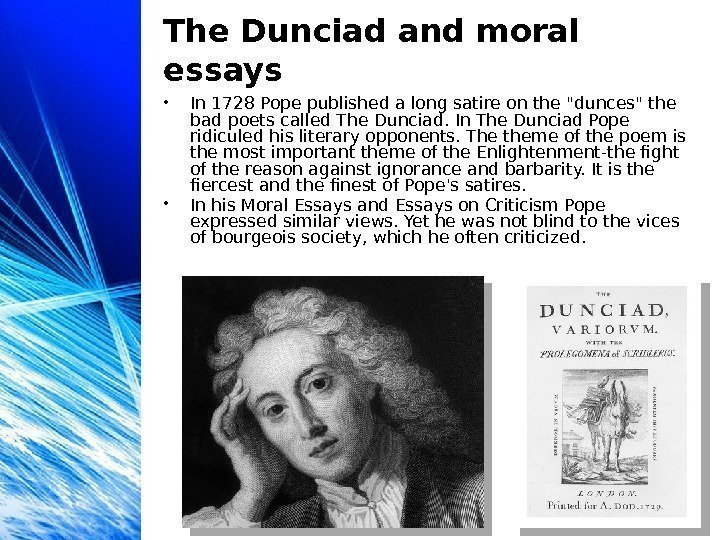
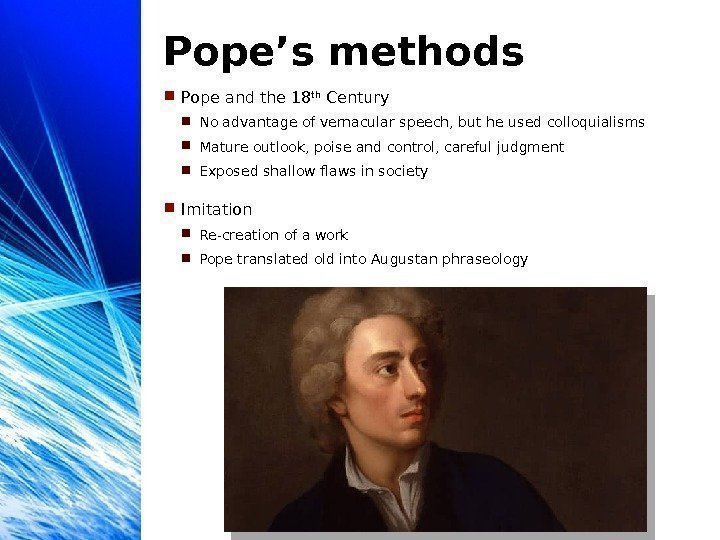
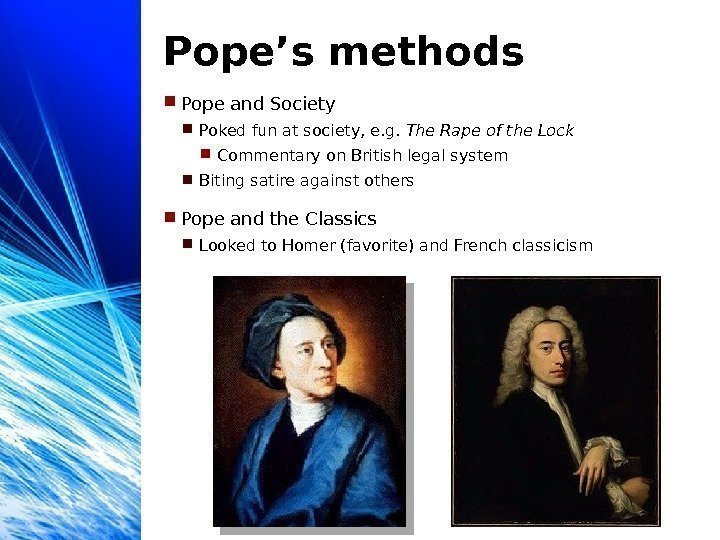
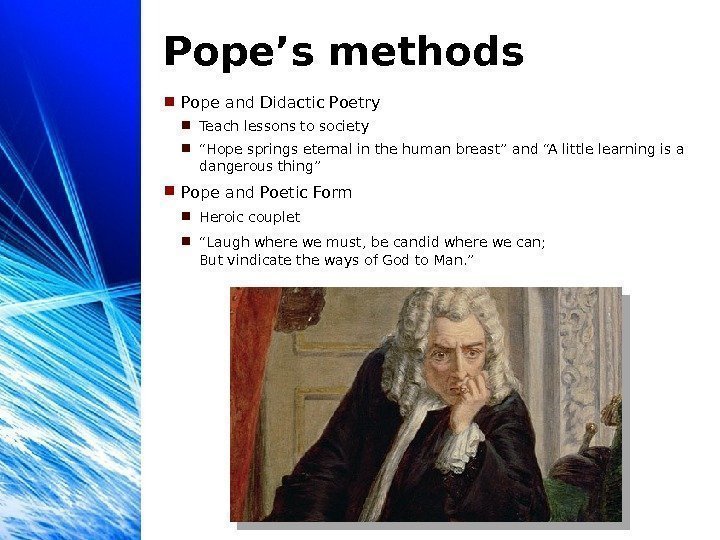
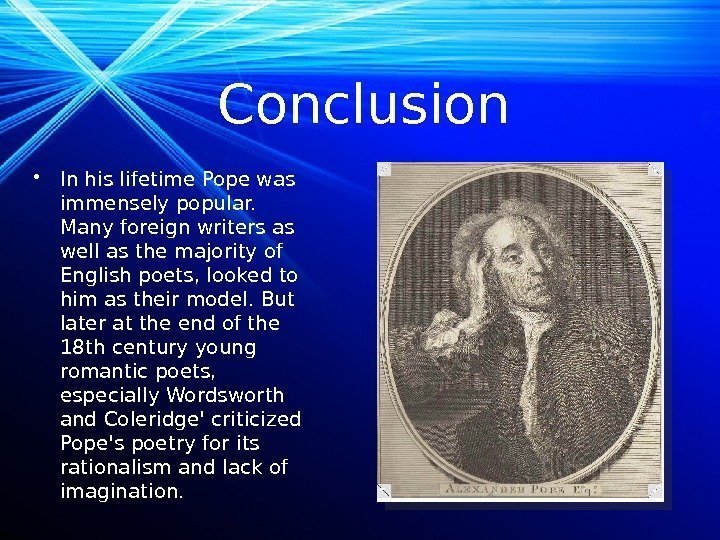
alexander_pope.pptx
- Размер: 2.1 Мб
- Автор:
- Количество слайдов: 9
Описание презентации Alexander Pope (1688 -1744) Short biography по слайдам
 Alexander Pope (1688 -1744)
Alexander Pope (1688 -1744)
 Short biography • Born May 21, 1688, London • Crippled at 12; hunchback • Never married, but involved with two women in his life: Martha Blount and Lady Mary Wortley Montagu • Never formally educated because he was Catholic • Gained an appreciate for the classics and writing • Conformed to strict writing rules • Died 1744, Twickenham
Short biography • Born May 21, 1688, London • Crippled at 12; hunchback • Never married, but involved with two women in his life: Martha Blount and Lady Mary Wortley Montagu • Never formally educated because he was Catholic • Gained an appreciate for the classics and writing • Conformed to strict writing rules • Died 1744, Twickenham
 Early career • Pope’s poetic career began with Four Pastorals published in 1709. These were short poems on spring, summer, autumn and winter closely fashioned on Virgili. His Essay on Criticism contained Pope’s aesthetic views. • A «heroi-comical» poem, as Pope himself called it, The Rape of the Lock which appeared in 1712 enjoyed instant success. It was founded on an incident which occurred at that time. A certain Lord Petre cut a lock of hair from the head of young beauty named Arabella Fermor. This practical joke led to a quarrel between the two families. Pope wrote a long poem in which the society is pictured in detail and satirized with great wit.
Early career • Pope’s poetic career began with Four Pastorals published in 1709. These were short poems on spring, summer, autumn and winter closely fashioned on Virgili. His Essay on Criticism contained Pope’s aesthetic views. • A «heroi-comical» poem, as Pope himself called it, The Rape of the Lock which appeared in 1712 enjoyed instant success. It was founded on an incident which occurred at that time. A certain Lord Petre cut a lock of hair from the head of young beauty named Arabella Fermor. This practical joke led to a quarrel between the two families. Pope wrote a long poem in which the society is pictured in detail and satirized with great wit.
 Illiad and The Essay on Man • Pope’s next work was the translation of the Illiad. Pope translated Homer in the elegant artificial language of his own age and gave the reading public what it wanted a readable version of the Greek poem in accordance with the taste of time. • One of the best known and most quoted of his works is The Essay on Man. The purpose of the essay is to justify the existing state of things.
Illiad and The Essay on Man • Pope’s next work was the translation of the Illiad. Pope translated Homer in the elegant artificial language of his own age and gave the reading public what it wanted a readable version of the Greek poem in accordance with the taste of time. • One of the best known and most quoted of his works is The Essay on Man. The purpose of the essay is to justify the existing state of things.
 The Dunciad and moral essays • In 1728 Pope published a long satire on the «dunces» the bad poets called The Dunciad. In The Dunciad Pope ridiculed his literary opponents. The theme of the poem is the most important theme of the Enlightenment-the fight of the reason against ignorance and barbarity. It is the fiercest and the finest of Pope’s satires. • In his Moral Essays and Essays on Criticism Pope expressed similar views. Yet he was not blind to the vices of bourgeois society, which he often criticized.
The Dunciad and moral essays • In 1728 Pope published a long satire on the «dunces» the bad poets called The Dunciad. In The Dunciad Pope ridiculed his literary opponents. The theme of the poem is the most important theme of the Enlightenment-the fight of the reason against ignorance and barbarity. It is the fiercest and the finest of Pope’s satires. • In his Moral Essays and Essays on Criticism Pope expressed similar views. Yet he was not blind to the vices of bourgeois society, which he often criticized.
 Pope’s methods Pope and the 18 th Century No advantage of vernacular speech, but he used colloquialisms Mature outlook, poise and control, careful judgment Exposed shallow flaws in society Imitation Re-creation of a work Pope translated old into Augustan phraseology
Pope’s methods Pope and the 18 th Century No advantage of vernacular speech, but he used colloquialisms Mature outlook, poise and control, careful judgment Exposed shallow flaws in society Imitation Re-creation of a work Pope translated old into Augustan phraseology
 Pope’s methods Pope and Society Poked fun at society, e. g. The Rape of the Lock Commentary on British legal system Biting satire against others Pope and the Classics Looked to Homer (favorite) and French classicism
Pope’s methods Pope and Society Poked fun at society, e. g. The Rape of the Lock Commentary on British legal system Biting satire against others Pope and the Classics Looked to Homer (favorite) and French classicism
 Pope’s methods Pope and Didactic Poetry Teach lessons to society “ Hope springs eternal in the human breast” and “A little learning is a dangerous thing” Pope and Poetic Form Heroic couplet “ Laugh where we must, be candid where we can; But vindicate the ways of God to Man. ”
Pope’s methods Pope and Didactic Poetry Teach lessons to society “ Hope springs eternal in the human breast” and “A little learning is a dangerous thing” Pope and Poetic Form Heroic couplet “ Laugh where we must, be candid where we can; But vindicate the ways of God to Man. ”
 • In his lifetime Pope was immensely popular. Many foreign writers as well as the majority of English poets, looked to him as their model. But later at the end of the 18 th century young romantic poets, especially Wordsworth and Coleridge’ criticized Pope’s poetry for its rationalism and lack of imagination. Conclusion
• In his lifetime Pope was immensely popular. Many foreign writers as well as the majority of English poets, looked to him as their model. But later at the end of the 18 th century young romantic poets, especially Wordsworth and Coleridge’ criticized Pope’s poetry for its rationalism and lack of imagination. Conclusion

